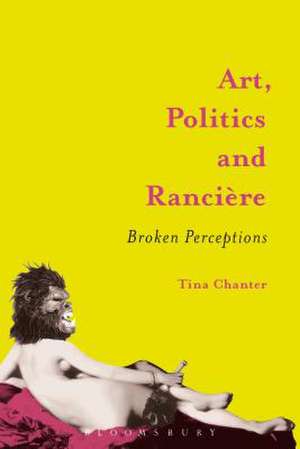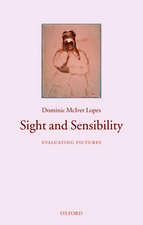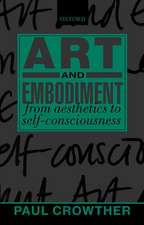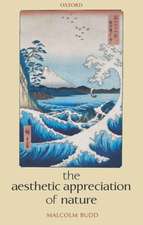Art, Politics and Rancière: Broken Perceptions
Autor Tina Chanteren Limba Engleză Paperback – 26 iun 2019
| Toate formatele și edițiile | Preț | Express |
|---|---|---|
| Paperback (1) | 229.59 lei 6-8 săpt. | |
| Bloomsbury Publishing – 26 iun 2019 | 229.59 lei 6-8 săpt. | |
| Hardback (1) | 714.12 lei 6-8 săpt. | |
| Bloomsbury Publishing – 13 dec 2017 | 714.12 lei 6-8 săpt. |
Preț: 229.59 lei
Preț vechi: 264.43 lei
-13% Nou
Puncte Express: 344
Preț estimativ în valută:
43.95€ • 45.20$ • 36.46£
43.95€ • 45.20$ • 36.46£
Carte tipărită la comandă
Livrare economică 15 februarie-01 martie
Preluare comenzi: 021 569.72.76
Specificații
ISBN-13: 9781350119031
ISBN-10: 1350119032
Pagini: 200
Ilustrații: 2 b/w illustrations
Dimensiuni: 156 x 234 x 14 mm
Greutate: 0.29 kg
Editura: Bloomsbury Publishing
Colecția Bloomsbury Academic
Locul publicării:London, United Kingdom
ISBN-10: 1350119032
Pagini: 200
Ilustrații: 2 b/w illustrations
Dimensiuni: 156 x 234 x 14 mm
Greutate: 0.29 kg
Editura: Bloomsbury Publishing
Colecția Bloomsbury Academic
Locul publicării:London, United Kingdom
Caracteristici
Features discussion of the artists Ingrid Mwangi, Phillip Noyce, Ingrid Pollard, and Gillian Wearing
Notă biografică
Tina Chanter is Professor of Philosophy and Gender at Kingston University, UK.
Cuprins
1. Gendering and Racing the History of Aesthetics 2. Rethinking Politics, Time, and Space: what Kant got right, and what he got wrong 3. A Rancierian Critique of Levinas and Heidegger 4. "There is a worse and a better police:" Why Identity Politics is Still the Police 5. Conclusion: Another Time, Another Space: Politics as Lots of Little Ongoing Redistributions BibliographyIndex
Recenzii
Tina Chanter appreciates like no other thinker that for Rancière, aesthetics and politics are inseparable. In this learned study she unravels the political powers of perceptibility and imperceptibility, and astutely articulates the modernist aesthetic sensibilities at the heart of Rancière's democratic politics. In short, this book is a welcome and needed addendum to those interpretations of Rancière's work that disregard the political power of the aesthetic and the aesthetic power of politics.
In this beautifully written book, Tina Chanter gives a compelling and critical outline of Jacques Rancière's conjunction between art and politics. She is particularly impressive in filling out some of the details missing from his selective references to the history of philosophy on topics like tyranny and slavery. Chanter's driving contention is that Rancière does not adequately address the questions at the core of feminist politics. From this premise, she takes his ideas in new directions, some of them antithetical to his most cherished positions. The result is a stimulating and provocative work that draws Rancière's thought into new arenas and debates.
Providing a philosophically expansive understanding of Rancière's views of the interweaving of aesthetics and politics, Tina Chanter deftly distills his recasting of major ideas, such as those about the relation between art and life, the hierarchy of form and matter, and the Kantian aesthetic community. She luminously traces how Rancière both looks into and runs away from gender, race, and coloniality. By reading him alongside contemporary feminist art, she persuasively shows how we nonetheless can at once insist-with Rancière-on the potentialities of dissensus as central to politics and artistic critique, and hold assumptions of equality to the standards they champion.
In Art, Politics, and Rancière Tina Chanter offers at once a brilliant analysis of Rancière's work and weaves a compelling feminist counter-narrative to his logic of dissensus, sensibility, and social protest. In so doing she shows how aesthetic and political distributions and redistributions of the sensible are invariably gendered and radicalized in ways that resist easy equivalence or subsumption under the category of class, or under a too abstract notion of "a part that has no part." A key contribution to philosophical and feminist debates about aesthetics, art, and politics.
In this beautifully written book, Tina Chanter gives a compelling and critical outline of Jacques Rancière's conjunction between art and politics. She is particularly impressive in filling out some of the details missing from his selective references to the history of philosophy on topics like tyranny and slavery. Chanter's driving contention is that Rancière does not adequately address the questions at the core of feminist politics. From this premise, she takes his ideas in new directions, some of them antithetical to his most cherished positions. The result is a stimulating and provocative work that draws Rancière's thought into new arenas and debates.
Providing a philosophically expansive understanding of Rancière's views of the interweaving of aesthetics and politics, Tina Chanter deftly distills his recasting of major ideas, such as those about the relation between art and life, the hierarchy of form and matter, and the Kantian aesthetic community. She luminously traces how Rancière both looks into and runs away from gender, race, and coloniality. By reading him alongside contemporary feminist art, she persuasively shows how we nonetheless can at once insist-with Rancière-on the potentialities of dissensus as central to politics and artistic critique, and hold assumptions of equality to the standards they champion.
In Art, Politics, and Rancière Tina Chanter offers at once a brilliant analysis of Rancière's work and weaves a compelling feminist counter-narrative to his logic of dissensus, sensibility, and social protest. In so doing she shows how aesthetic and political distributions and redistributions of the sensible are invariably gendered and radicalized in ways that resist easy equivalence or subsumption under the category of class, or under a too abstract notion of "a part that has no part." A key contribution to philosophical and feminist debates about aesthetics, art, and politics.




















